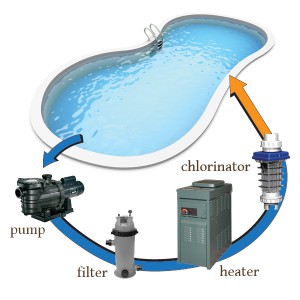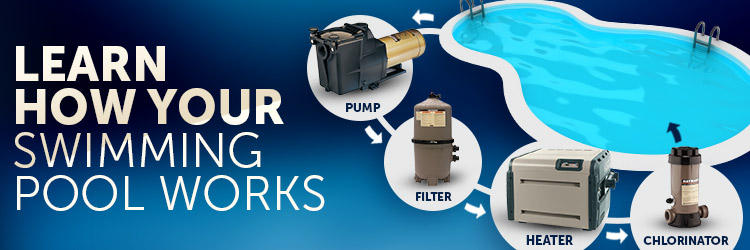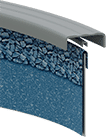The cool thing about a swimming pool is they all work in the same manner. No matter the size, shape, or added features, they all use a combination of filtration and chemical treatment to consistently keep the water clean and healthy. But really, how does a swimming pool work?
As a new pool owner, you might not have a handle of the ‘ins’ and ‘outs’ of your pool yet, and that is okay.

There are two different types of pools, above ground and inground. Aboveground pools are the cheapest construction option and the easiest to construct as well. They are typically made from prefabricated kits and are easily installed by a pool professional. On the other hand, in-ground pools are made from gunite, concrete, fiberglass, or vinyl liner. While the design of these pools is different, they all rely on the same basic plumbing and filtering system.
The Flow of Water
Water in a swimming pool needs to circulate through a filtering system to remove dirt and debris. During normal operation, water flows through the filtering system through two or more main drains at the bottom of the pool and multiple skimmers around the top of the pool. In your pool, the water is pulled through the main drain, the skimmer, and the vacuum port. Skimmers collect and skim water on the surface by propelling the water and screening out the largest debris in the strainer basket. This allows for an evenly heated pool and uniform chemical treatment.
Afterwards, it is sent through the pump, the filter, the heater, and then returned back into the pool through the return fittings. You may need to add an additional pump for waterfalls and jets.
Your Pump and Filter
In order for a swimming pool to be free from algae and other harmful contaminants, the pool must have a working filter. However, without a pump, your filtering system will not work and your pool will get too dirty to use.
The Pump

The heart of the pool system is the pump. The electric motor on the pump spins the impeller inside the housing and drives the water from the various drains. Once the water is pulled through the skimmers, it flows through the wet end portion of your pool pump. The wet end portion of your pump includes the strainer lid, strainer o-ring, strainer basket, diffuser, impeller, and a shaft seal. The water passes through the pump and out of the discharge of the pump into the filter.
The Filter
During the filtering operation, the dirty water from the pool comes through the filter’s inlet pipe and heads to the water distribution head inside the tank. As gravity pulls the water down, depending on the type of filter you have, either sand, cartridge, or diatomaceous earth catches the dirt and debris. Pressure gauges at the inlet and outlet give you an idea of how much blockage the filter currently has. If gauges show much greater pressure on the inlet pipe than the outlet, it is an indication there’s a lot of collected debris and it is time to backwash or clean your filter cartridges.
Balancing Your Pool Water
Although the filter system handles all the hard work in keeping your pool water clean and healthy, water chemistry handles all the fine touches. A healthy chemical balance is essential to not just your pool but also to the rest of your pool equipment. A pool filled with untreated water is a perfect harvesting place for pathogens and other disease-carrying microorganisms. Pools with the incorrect chemical balance can damage other parts of your pool, irritate your skin and eyes, and cause your water to become very gray and cloudy. Thus making your pool experience a rather unpleasant one.
Chlorine
The most popular disinfectant is chlorine. When chlorine is added to the water, it reacts with the water to form various other chemicals. Chlorine is typically prepared in liquid, powder, or tablet form. Pool experts generally recommend adding chlorine just after the filtering process, using a chemical feeder. If added directly into the pool, chlorine tends to be too concentrated in certain areas and not evenly distributed.
When chlorine reacts with water, one of the most notable chemical reactions is hypochlorous acid. One problem with hypochlorous acid is that it is highly unstable. It degrades when exposed to sunlight and may combine with other chemicals to form new compounds. Often times chlorinators include a stabilizing agent, like cyanuric acid, that will form a more stable compound once it reacts with the chlorine.
Heating Your Pool
No one likes to swim in a dirty pool or a cold one for that matter. Swimming pool heaters have increasingly become very popular and a “must have” for pools in certain areas in the country. There are various methods to heat your pool: heaters, heat pumps, solar panels, or solar covers. Many of our customers use a combination of these to reach the maximum heat potential while using the least amount of energy. Still, pool heaters are the most popular. Both propane and natural gas pool heaters are good for heating a pool quickly and are able to maintain a constant water temperature.

Heat Pumps
Pool heat pumps are a more efficient, environmentally friendly way to heat a pool. It can save a pool owner a lot of money in operating costs, however, unlike gas heaters, a heat pump’s effectiveness is dependent upon the weather. They operate by extracting heat from the outside air, increasing the heat with a compressor, and then delivering the heat to the water. If the temperature is below 45 degrees, the heat pump will not function. So, depending on the average temperature of where you live, a pool heat pump may or may not be the best choice for you.
Gas Heaters
Gas heaters create a flame on a gas burner that heats a metal heat exchanger. Once your pool water flows through the filter it ends up at the heater next. Gas burns in a combustion chamber that heats the water as it passes through. Over time, the circulated pool water will warm up and maintain a constant temperature
The longevity of each pool equipment varies from pool to pool depending on your location, how often you run each system, and also the water chemistry in your pool. We offer an extensive list of how to guides for pool owners that provides step by step tutorials and videos to help you along the way. Remember, when in doubt, call a pool professional. There is nothing worse than spending money to fix something that could have easily been solved from day one.








Leave a Reply